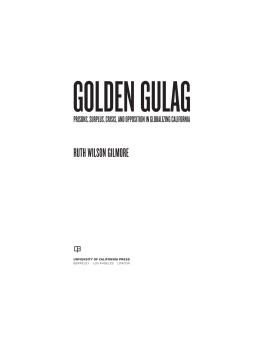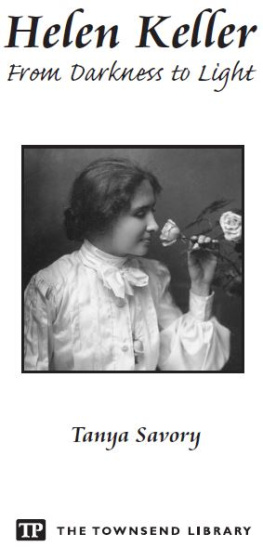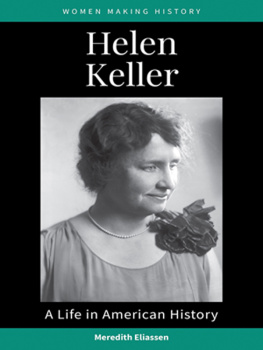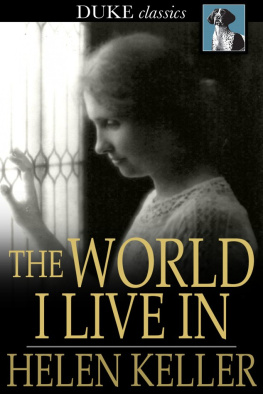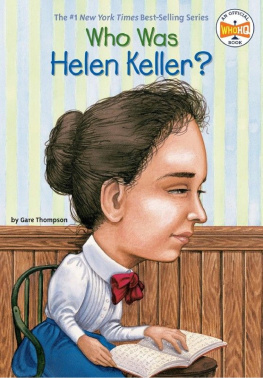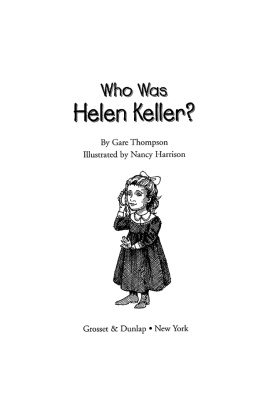American Council of Learned Societies. - The Radical Lives of Helen Keller
Here you can read online American Council of Learned Societies. - The Radical Lives of Helen Keller full text of the book (entire story) in english for free. Download pdf and epub, get meaning, cover and reviews about this ebook. City: New York;United States, year: 2007;2004, publisher: New York University Press, genre: Politics. Description of the work, (preface) as well as reviews are available. Best literature library LitArk.com created for fans of good reading and offers a wide selection of genres:
Romance novel
Science fiction
Adventure
Detective
Science
History
Home and family
Prose
Art
Politics
Computer
Non-fiction
Religion
Business
Children
Humor
Choose a favorite category and find really read worthwhile books. Enjoy immersion in the world of imagination, feel the emotions of the characters or learn something new for yourself, make an fascinating discovery.

- Book:The Radical Lives of Helen Keller
- Author:
- Publisher:New York University Press
- Genre:
- Year:2007;2004
- City:New York;United States
- Rating:3 / 5
- Favourites:Add to favourites
- Your mark:
- 60
- 1
- 2
- 3
- 4
- 5
The Radical Lives of Helen Keller: summary, description and annotation
We offer to read an annotation, description, summary or preface (depends on what the author of the book "The Radical Lives of Helen Keller" wrote himself). If you haven't found the necessary information about the book — write in the comments, we will try to find it.
American Council of Learned Societies.: author's other books
Who wrote The Radical Lives of Helen Keller? Find out the surname, the name of the author of the book and a list of all author's works by series.
The Radical Lives of Helen Keller — read online for free the complete book (whole text) full work
Below is the text of the book, divided by pages. System saving the place of the last page read, allows you to conveniently read the book "The Radical Lives of Helen Keller" online for free, without having to search again every time where you left off. Put a bookmark, and you can go to the page where you finished reading at any time.
Font size:
Interval:
Bookmark:
Thank you for buying this ebook, published by NYU Press.
Sign up for our e-newsletters to receive information about forthcoming books, special discounts, and more!
Sign Up!
A publisher of original scholarship since its founding in 1916, New York University Press Produces more than 100 new books each year, with a backlist of 3,000 titles in print. Working across the humanities and social sciences, NYU Press has award-winning lists in sociology, law, cultural and American studies, religion, American history, anthropology, politics, criminology, media and communication, literary studies, and psychology.
The Radical Lives of Helen Keller
Kim E. Nielsen
Consulting Editor: Harvey J. Kaye

To Nathan
NEW YORK UNIVERSITY PRESS
New York and London
www.nyupress.org
2004 by New York University
All rights reserved
Library of Congress Cataloging-in-Publication Data
Nielsen, Kim E.
The radical lives of Helen Keller / Kim E. Nielsen
p. cm. (The history of disability series)
Includes bibliographical references and index.
ISBN 0814758134 (hc : acid-free)
1. Helen Keller, 18801968.
2. Helen Keller, 18801968Political and social views.
3. Blind-deaf womenUnited StatesBiography.
4. Blind-deaf womenEducationUnited States.
I. Title. II. Series.
HV1624.K4N54 2003
362.4'1'092dc21 2003014386
New York University Press books are printed on acid-free paper, and their binding materials are chosen for strength and durability.
Manufactured in the United States of America
10 9 8 7 6 5 4 3 2 1
Unlike previous Hellen Keller biographers, I come to Keller as a historian trained in womens political lives in the twentieth-century United States. As a child I did not read Kellers mythical story or connect intensely with her image. Neither am I particularly interested in Anne Sullivan Macys education of her. Amazement with her disability and her accomplishments didnt prompt this book nor did a desire to commemorate her. My intellectual interests center around how U.S. women have justified, explained, embraced, fought for, and lived out their citizenship on personal, familial, local, and national levels. Helen Keller interests me because she was one of the most influential and widely recognized women of the twentieth century, whose primary interests were political but whose political life has been largely ignored.
The best part about writing on Helen Keller is the people I have met along the way. The generosity, intellectual energy, good spirits, and collegiality of the disability studies community are unparalleled. Paul Longmore and Lauri Umansky served as model editors, responding with good cheer to questions large and small. Susan Burch, Derek Jeffreys, Murdoch Johnson, Harvey Kaye, Linda Kerber, Brynne Thomas, and Dianne Tuff read the manuscript at pivotal moments and offered sound advice. Linn Heider is doubly talented, providing loving childcare and spotting me on the bench press. Commentators, fellow panelists, and audience members at meetings of the Organization of American Historians, Society for Disability Studies, Berkshire Conference on Womens History, Southern Historical Association, and the University of Wisconsin-System Womens Studies Conference offered insightful comments and vigorous questions. All helped to make this book better.
Without librarians, archivists, and financial assistance I could not have finished this book. Staff members at the American Foundation for the Blind gave repeated assistance cheerfully. Thanks also go to Perkins School for the Blind, the Franklin and Eleanor Roosevelt Library, and the Library of Congress. The interlibrary loan staff at the University of Wisconsin-Green Bay found every item I sought. The Franklin and Eleanor Roosevelt Institute and the University of Wisconsin-Green Bay also provided financial assistance.
Finally, as always, my deepest appreciation goes to Nathan, Morgan and Maya. They make life infinitely richer and endlessly interesting.
I Do Not Like This World As It Is
19001924
I do not like this world as it is. I am trying to make it a little more as I would like to have it.
Helen Keller, 1913
Anne Sullivan, Keller insisted, transformed her from Phantom to Helen. As an elderly woman she referred to her pre-Sullivan childhood self as Phantom the little being governed only by animal impulses. She believed her teacher enabled her to become fully human by teaching her language. It was the first major transformation in her life.
College similarly transformed Keller from a child to an adult. Many considered her disability to mean that she would be forever childish and childlike, regardless of age. She was never able to dismantle everyones debilitating assumptions about her disability but graduating from Radcliffe radically changed her own. Becoming an adult meant moving away from the highly insulated life of a middle-class young girl made even more isolated by fame, deaf-blindness, an Alabama farm, and a Boston institution for blind children. Becoming an adult meant moving away from Tuscumbia and Perkins, turning to teachers and a world beyond Sullivan, wrestling with self-sufficiency on all levels, and embracing herself as fully human. It is frustrating that most of our cultural memories of Helen Keller end before she even got this far.
When Helen entered Radcliffe College in 1900 at twenty years of age, she encountered a knot of conflicting messages. Radcliffe, the female counterpart to Harvard, was one of the premier colleges for young women.
To enter college, Keller had not only to deal with her allegedly disabled female body but also the supposed failings of her actually disabled body. By the time she entered Radcliffe, she had endured nearly twenty years of deliberations as to whether or not she had the capacity to learn, to communicate, or simply to be decent in a public space. While to her, the thought of going to college took root in my heart and became an earnest desire, to others her college admission was unadvisable, unnatural, and even dangerous. The skeptical interpreted any physical ailment of hers as evidence of a nervous and physical breakdown due to overwork, proof that her body was unable to withstand the rigors that college demanded of even the normal female body. Anne Sullivan, critics insisted, had to be the real brains and student of the duo, since surely Kellers disability rendered her incapable.
Radcliffe thrilled and unsettled her. She mastered French, German, Greek, and Latin, but the structural impediments were huge. Few books were Brailled. Sullivan had to finger-spell most written materials and all course lectures, a time-consuming and physically taxing process for both of them. Sullivans eyesight, which multiple surgeries had improved, now weakened seriously. Looking back in 1956, Keller remembered the agony caused by Sullivans ailing eyes: How I hated books at that moment! When she asked if I did not want certain passages reread, I lied and declared that I could recall them. The measures taken by Radcliffe during examinations, intended to prevent Sullivan from giving Keller the answers,
Radcliffe was also personally isolating. Helen admitted, I have sometimes had a depressing sense of isolation in the midst of my classmates. Few could communicate with her. She lived apart from the rest of the students and was already a celebrity. The academics were intellectually exciting and provocative: My soul was set aflame! Yet she grew frustrated at the failure of her professors to link course materials to contemporary and personal conditions: Many scholars forget, it seems to me, that our enjoyment of the great works of literature depends more upon the depth of our sympathy than upon our understanding. This frustration may have deepened because of her passion for and dependence on the written word, which intensified while at Radcliffe. As she put it, literature is my Utopia. Here I am not disfranchised. No barrier of the senses shuts me out from the sweet, gracious discourse of my book-friends.
Next pageFont size:
Interval:
Bookmark:
Similar books «The Radical Lives of Helen Keller»
Look at similar books to The Radical Lives of Helen Keller. We have selected literature similar in name and meaning in the hope of providing readers with more options to find new, interesting, not yet read works.
Discussion, reviews of the book The Radical Lives of Helen Keller and just readers' own opinions. Leave your comments, write what you think about the work, its meaning or the main characters. Specify what exactly you liked and what you didn't like, and why you think so.


